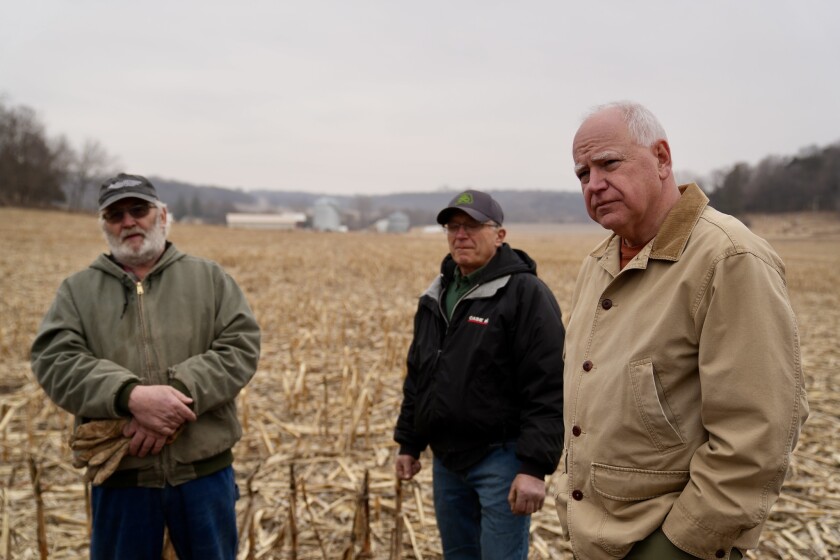CANNON FALLS, Minn. — On the same day Minnesota Gov. Tim Walz and Minnesota Agriculture Commissioner Thom Petersen visited a corn and soybean farm in southeast Minnesota to highlight the impact a trade war would have on the state's farmers.
Walz and Petersen spoke at the Lundell family farm in Cannon Falls operated by Danny and Mary Lundell.
ADVERTISEMENT
Canada and Mexico are among the top three countries for Minnesota’s agricultural exports, and both countries are expected to retaliate. Canadian Prime Minister Justin Trudeau said the tariffs would disrupt an "incredibly successful" trading relationship and violate the U.S.-Mexico-Canada free trade agreement signed by Trump.
"We have to be trusted trading partners, because folks are working too hard out here, producing what the world needs," Walz said, before warning those who think a trade war with top U.S. trade partners will work.
"That's a very simplistic way of looking about this," Walz said. "The one thing that's going to happen, if this thing goes on for any amount of time, is these trading partners are going to look for other partners. They're going to look elsewhere. And we know we've lost markets for our soybeans to China the last time we did this. They went to Brazil, they went to Argentina. They'll go somewhere else."
Petersen said the tariffs will put the ag economy into a similar situation than in Trump's first term in office. What he's not sure about is Trump's long-term thinking when it comes to trade with Canada and Mexico.
"People forget that we have a process in place. President Trump negotiated the USMCA, which took over for NAFTA," Petersen said. "We have a trade agreement in place that I would argue is working. We've had decisions both against Mexico and Canada that have ruled in our favor, that have opened up those negotiations."
The USMCA is up for review in 2026, which Petersen said should be the federal focus.
"Not putting a tariff on our neighbors and our biggest customers," Petersen said.
ADVERTISEMENT
Neighbors to the north
Petersen said no matter what business you're in, you have to consider how you treat your customers because the relationship is always a two-way street. With Minnesota and Canada, that street sees almost a billion dollars annually in ag products going both ways.
"Think about corn that we sell there, when our ethanol market is a burgeoning piece that's really opening up," Petersen said. "I was at a plant in southwest Minnesota who was just working on signing their agreement to go into Canada. Now they're not sure what they're going to do."
The pork industry in Minnesota, which ranks second in the country for production, is set to lose from tariffs with Canada.
"We import almost 750,000 piglets from Canada," he said. "Very interdependent on that."
The impact from the tariffs on is at the top of the list as far as economic fallout, said Danny Lundell.
"Potash comes out of Canada, and it's not produced here," he said. "We need potash to raise healthier crops. And it doesn't matter if you're big, medium or small, it is going to affect you."
His cousin, Stan Lundell, who also farms crops and raises beef cattle, said there will be "no winners" from the tariffs.
ADVERTISEMENT
"It's not just going to be the ag community, but every sector of the economy is going to be affected by this," Stan Lundell said. "It will inflict pain on everybody, for what?"

Petersen said the projected impact from tariffs comes at a bad time for farmers, especially in the crop industry. The ag commissioner said that farmer-lender mediation reports from this year were seven times higher than they were one year ago, marking a dire financial period for the state's farmers.
“These tariffs are going to add a lot of stress and a lot of uncertainty to our farmers,” Petersen said. “I hope that as we work with the USDA, as we work with our congressional delegation, that calmer heads prevail, and they're able to get to this piece where we're negotiating and back to building relationships, because I think that that's what we feel works.”
Peterson said the state may need to find creative approaches to the situation. Walz echoed that sentiment.
“All of us need to work together with all this uncertainty federally, I think it behooves all of us to provide some calm and certainty here, to reach some compromises, to get along together, get things done on time,” Walz said.
Minnesota Rep. Paul Anderson, R-Starbuck, who farms corn, soybeans and wheat in central Minnesota, said he plans to push legislation to try and help farmers from a state level to “weather these uncertain times.” Anderson said the tariffs will undoubtedly have an impact on the industry, but also that farmers in the state have largely been supportive of Trump and may show some heightened tolerance when it comes to the president.
“My hope and understanding is that he's a smart businessman, and we certainly have confidence that he knows what he's doing, and can you know, reach the goals he's trying to reach,” Anderson said. “I think farmers will give him time. I'm not certain how much time, but he had very strong support from the farm community in the election. Realizing that he was, he was very pro-business, that's what farmers like.”
ADVERTISEMENT
Minnesota ranks as the fourth largest agricultural exporter in the nation, with exports accounting for more than a third of the state’s total agricultural sales and bringing in $9.2 billion a year, according to the Minnesota Department of Agriculture.
Canada, Mexico and China mark Minnesota’s three largest trading partners, with $7 billion in goods to Canada in 2023, $3 billion to Mexico, and $2.3 billion to China according to the Minnesota Department of Employment and Economic Development.














